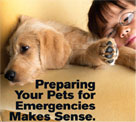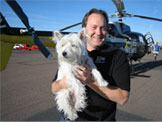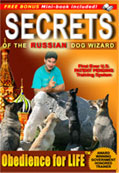August 25, 2007
HOMELAND SECURITY - Emergency Planning
For Your Pet's Safety
Erin Streeter, Ready Campaign
 The
thought of losing a beloved pet is truly something no pet owner
can comprehend. People rely on their pets for companionship and
our pets in turn rely on us to take care of their everyday needs.
That is why the U.S. Department of Homeland Security's Ready
Campaign is urging pet owners to take action during National Preparedness
Month, which is held annually in September, to plan for their
pet's safety if an emergency strikes their community.
The
thought of losing a beloved pet is truly something no pet owner
can comprehend. People rely on their pets for companionship and
our pets in turn rely on us to take care of their everyday needs.
That is why the U.S. Department of Homeland Security's Ready
Campaign is urging pet owners to take action during National Preparedness
Month, which is held annually in September, to plan for their
pet's safety if an emergency strikes their community.
Ready
is a national public service advertising campaign produced by
The Advertising Council for the U.S. Department of Homeland Security,
which is designed to educate and empower Americans to prepare
for and respond to emergencies including natural disasters and
potential terrorist attacks. As the Department encourages families
to prepare for emergencies through Ready, we are regularly
asked if there is information appropriate for pet owners. In response
to these requests, Homeland Security has partnered with several
national animal organizations to develop emergency preparedness
information for owners of domestic pets.
The U.S. Department of Homeland Security
consulted with a number of organizations experienced in animal
health and wellbeing to develop Ready information for pet
owners. These organizations include American Kennel Club (AKC),
American Society for the Prevention of Cruelty to Animals (ASPCA),
American Veterinary Medical Association (AVMA), and Humane Society
of the United States (HSUS).
Included in this Ready Campaign
information is a brochure and instructional video that highlight
the key steps pet owners should take to prepare themselves and
their animals. The brochure and video encourage pet owners to
make an emergency supply kit including pet food and water, medications
and medical records, leashes, ID tags and other appropriate supplies.
The communication pieces also recommend pet owners have an emergency
plan that considers their pets needs and that they learn more
about the types of emergencies that can happen in their area and
the appropriate responses.
Pet owners can download the free brochure
and instructional video from the Ready Web site or request a copy of the
brochure by calling 1-800-BE-READY.
Make a Disaster Plan that Includes
Your Pets
Dr. Debbie White, Lone Mountain
Animal Hospital
 Current
statistics cite that more than ever our pets are significant members
of the family. In fact, according to an American Animal Hospital
Association (AAHA) pet survey, 93% of pet owners would risk their
own life for their pet. The figure demonstrates the strong emotional
bond that people have with their pets. For many of us, we couldn't
imagine leaving our pets behind in the face of an emergency. Unfortunately,
that is exactly what so many hurricane evacuees were forced to
do in 2005. We all can recall seeing the images of abandoned pets,
forced separations and animals struggling to survive. There was
no doubt a lot of human and animal tragedy during the hurricane
season and many lessons were learned. The greatest lessons perhaps
were that one cannot be too prepared and that we must also consider
the need of pets and animals that we care for.
Current
statistics cite that more than ever our pets are significant members
of the family. In fact, according to an American Animal Hospital
Association (AAHA) pet survey, 93% of pet owners would risk their
own life for their pet. The figure demonstrates the strong emotional
bond that people have with their pets. For many of us, we couldn't
imagine leaving our pets behind in the face of an emergency. Unfortunately,
that is exactly what so many hurricane evacuees were forced to
do in 2005. We all can recall seeing the images of abandoned pets,
forced separations and animals struggling to survive. There was
no doubt a lot of human and animal tragedy during the hurricane
season and many lessons were learned. The greatest lessons perhaps
were that one cannot be too prepared and that we must also consider
the need of pets and animals that we care for.
Recent legislation is under consideration
within Congress that addresses this very issue. The Pet Evacuation
and Transportation (PETS) Act would mandate that state and local
authorities make preparedness steps for the evacuation, housing
and care for animals that may be impacted by a major emergency.
The PETS Act would help with large-scale emergency plans that
affect an entire community, but what about your family and your
pet? It is vital that disaster planning starts at the individual
household level.
Think Ahead-Make a Plan
The first step in accounting for your pets during an emergency
is to make a household disaster plan that includes the family
pets. Sit down and write a list of all of the items you would
need to care for your pet. These might include food, bottled water,
feeding bowls, leashes, pet carrier or cage, litter pans, heartworm
preventative, prescription medications and a copy of vaccinations.
Then you need to put all of these items together in an easy to
grab bag or container. These items should be designated as "Pet
Emergency Kit" and not for regular use. Supplies should meet
your pet's needs for at least 72 hours.
Ensure Proper Identification
Make sure your pet is microchipped and wears identification tags.
Other identification items to include in your pet emergency kit
consist of a photo of your pet, copies of medical records and
vaccination history.
Have an Alternate Plan
If there was no way to evacuate with your pet, then have alternate
options for pet care away from home. Remember that there is limited
capacity for pet housing at local animal shelters and veterinary
hospitals. Keep a listing of pet-friendly hotels that will accept
both you and your pets. Have contacts for both in-town and out-of-town
family or friends that will take care of your pets in your absence.
Take Action
No one is immune to the possibility of a major disaster. Possible
disasters that could impact your local community include floods,
fires, earthquakes, chemical spills or terrorist events. The time
is now to prepare for the unexpected emergency. Take steps today
to prepare both your family and pet disaster kits. For more information
on family disaster planning visit http://www.SouthernNevadaHealthDistrict.org and
for pet disaster planning information visit http://www.AVMA.org/disaster.
http://www.LMAH.net
Testicular Implantation for Pets
Gregg Miller, Neuticles
 The
neutering procedure used today on family pets was developed in
the early 1800's, with the first commercial implantation being
performed on Dec. 20, 1995.
The
neutering procedure used today on family pets was developed in
the early 1800's, with the first commercial implantation being
performed on Dec. 20, 1995.
Since that time, over 60,000 canines,
felines, horses and bulls have been "Neuticled" in all
50 states and 24 countries.
"We've even Neuticled a prairie dog
in Kansas, two water buffalo in Colorado and a colony of rats
in Louisiana," Miller said
Neuticles are providing a solid solution
to the pet overpopulation crisis by encouraging thousands of caring
pet owners to neuter that simply would not before.
The texture and firmness of NeuticleNaturals
were crafted based on the firmness of actual animal testicles.
Neuticles replicate the testicle in actual size, shape and weight
and feel.
Loving pet owners are less 'neuter-hesitant'
and their pet is unaware that he has, in fact, been altered. With
Neuticles- its like nothing ever changed.
http://www.Neuticles.com
Kyle Orent Montage: A STORY IN THE
MAKING
 Listen
in as we tell the story of Kyle Orent, an 8-year-old from Northport,
New York who raised more than $20,000 selling lemonade and donated
it to Canine Companions for Independence. When asked why he chose
this charity, Kyle says he is a big animal lover and likes how
these animals have been trained to assist their humans and wants
to help.
Listen
in as we tell the story of Kyle Orent, an 8-year-old from Northport,
New York who raised more than $20,000 selling lemonade and donated
it to Canine Companions for Independence. When asked why he chose
this charity, Kyle says he is a big animal lover and likes how
these animals have been trained to assist their humans and wants
to help.
Well, that wasn't enough for Kyle. His
next endeavor was to raise an additional $10,000 by auctioning
off autographed dog collars signed by celebs. Animal Radio, through
the generous donation of 100 collars from Bamboo, has helped Kyle
to reach his goal.
Some of the celebrities that have autographed
these collars are Leslie Nielsen, Betty White, Sheena Easton,
Joe Namath, Donald Trump, Billy Joel and Tatum O'Neal, to name
a few.
Now, it is up to you. The auction begins
August 30th. Please visit Kyle's Charity Auction on eBay and let the bidding begin! Not only will
you receive a great collar autographed by a celeb, but also 100%
of the proceeds goes to a great cause, Canine Companions for Independence.
Everyone wins!
NEWS UPDATE: Michael Vick Pleads Guilty
Guardian Unlimited by
Paolo Bandini
 Six years on from being selected
as the first pick in the 2001 NFL draft, the Atlanta Falcons quarterback
Michael Vick should have been looking forward to the best years
of his career. Instead, after announcing he would plead guilty
to federal dog-fighting charges yesterday afternoon, he is facing
a likely sentence of 12 to 18 months behind bars. Whether or not
he will ever play professional gridiron again remains to be seen.
Six years on from being selected
as the first pick in the 2001 NFL draft, the Atlanta Falcons quarterback
Michael Vick should have been looking forward to the best years
of his career. Instead, after announcing he would plead guilty
to federal dog-fighting charges yesterday afternoon, he is facing
a likely sentence of 12 to 18 months behind bars. Whether or not
he will ever play professional gridiron again remains to be seen.
Vick, along with co-defendants Quanis
Phillips, of Atlanta, Purnell Peace, of Virginia Beach, and Tony
Taylor, of Hampton, Virginia, stands accused of operating a dog-fighting
ring named Bad Newz Kennels out of a property he owns in Surry
County, Virginia. Already banned by the NFL from attending the
Falcons' pre-season training camp, Vick had previously denied
all charges, but his position was undermined after all three co-defendants
pleaded guilty last month and said they would testify against
him should the case reach trial.
 NEWS UPDATE
Brought To You By Simple Solution Natural Line Of Products
NEWS UPDATE
Brought To You By Simple Solution Natural Line Of Products
Hollywood Pigeons Go on "The Pill"
Laura Dodson, Argyle Civic
Association
 Research
shows that pigeon flocks cannot be eliminated through methods
such as trapping, poisoning or other conventional means. The flock
will grow back to the same size or larger as their numbers are
removed. The birds mate for life in the same home and live for
up to 15 years.
Research
shows that pigeon flocks cannot be eliminated through methods
such as trapping, poisoning or other conventional means. The flock
will grow back to the same size or larger as their numbers are
removed. The birds mate for life in the same home and live for
up to 15 years.
After months of research, investigation
and meetings with City of Los Angeles officials, the Argyle Civic
Association contacted PETA (People for the Ethical Treatment of
Animals) for assistance with the pigeon problem. PETA, the world's
largest and most important animal rights group, strongly advises
against the feeding of pigeons and other wild animals.
PETA provided the resources on using advanced
new methods of reducing the size of the flock. One method in particular
looked promising: OvoControl™
OvoControl™ is a birth control method
for birds and was registered with the United States EPA in May
of 2007. The technology has been developed by Innolytics LLC,
a hatch-control company based in Rancho Santa Fe, California.
OvoContol™ is administered to the birds via a special "treat"
which is distributed to the pigeons from rooftop dispensers. The
active ingredient, nicarbazin, interferes with the development
of the vitaline layer separating the egg white and yolk. This
membrane is vital to the viability of the egg and without it the
egg cannot develop or hatch. Originally developed to control populations
of resident Canada geese, the method has also been successfully
tested on feral pigeons under the guidance of the USDA Experiment
Station in Gainesville, FL.
http://argylecivic.org
Flying Dog is Grounded
Vladae, The Dog Wizard
 Molly,
the flying dog, has been grounded since the death of her guardian,
Craig Smith. Craig was a helicopter pilot whose helicopter collided
with another news helicopter in Arizona while covering a news
story. Molly had become a television personality by riding along
with Craig to cover the news.
Molly,
the flying dog, has been grounded since the death of her guardian,
Craig Smith. Craig was a helicopter pilot whose helicopter collided
with another news helicopter in Arizona while covering a news
story. Molly had become a television personality by riding along
with Craig to cover the news.
 Vladae
recalls fondly his tales of working with Craig and "Molly
the terror!" in training her to become the worlds first flying
dog with unofficial permission from the Aviation Department.
Vladae
recalls fondly his tales of working with Craig and "Molly
the terror!" in training her to become the worlds first flying
dog with unofficial permission from the Aviation Department.
Also, listen in for some great tips on
training your dog. For instance, did you know that you should
always eat first and then feed your dog? And look for Vladae the
Dog Wizard's syndicated problem solving segments. The first one
discusses the problem of dogs taking over the bed!
http://www.911DogWizard.com
Man Smuggles Geckos in Socks!
Britt Savage
 During
a search of his car, a man was caught with three native geckos
in Australia. The marble-velvet gecko, the eastern spiny-tailed
gecko and the three-spot gecko were stashed in his socks and were
believed to have been stolen from the wild in New South Wales.
During
a search of his car, a man was caught with three native geckos
in Australia. The marble-velvet gecko, the eastern spiny-tailed
gecko and the three-spot gecko were stashed in his socks and were
believed to have been stolen from the wild in New South Wales.
Some species of geckos could fetch big
money on the black market and then sold as pets. But this is not
the only concern of the Department of Sustainability and Environment
(DSE). Removing any kind of wildlife like these can heavily affect
the local population.
Rabies Still Exists and Still
Kills!
Dr. Charles Rupprecht, Centers
for Disease Control (CDC)
 The
Stephen King movie Cujo popularized rabies, when
a St. Bernard terrorized a mother and her son. The film also created
a catchphrase of sorts wild or crazy dogs are often sarcastically
referred to as 'Cujo.' The King film is fiction of course, but
the rabies virus is alive and well and, if proper steps aren't
taken, can still be deadly for humans and animals.
The
Stephen King movie Cujo popularized rabies, when
a St. Bernard terrorized a mother and her son. The film also created
a catchphrase of sorts wild or crazy dogs are often sarcastically
referred to as 'Cujo.' The King film is fiction of course, but
the rabies virus is alive and well and, if proper steps aren't
taken, can still be deadly for humans and animals.
In fact, there were nearly 7,000 cases
of animal rabies reported in the U.S. in 2006. Thankfully, rabies
is 100 percent preventable. However, prevention, which consists
of vaccinating animals, is neglected in many parts of world.
That's why the American Veterinary Medical Association (AVMA)
and the Centers for Disease Control (CDC) have teamed up with
veterinary and public health officials around the globe to sponsor
World Rabies Day, September 8, 2007.
Dr. Charles Rupprecht, Chief, Rabies Officer,
CDC, says rabies is a deadly disease caused by a virus that attacks
the nervous system. The virus is secreted in saliva and is usually
transmitted to people and animals by a bite from an infected animal.
"Once the outward signs of the disease appear, rabies is
nearly always fatal," says Dr. Rupprecht. "This is why
it is so important for the world to work together to make rabies
history by promoting the need for pets to be current on their
rabies vaccines."
Dr. Rupprecht offers some simple tips to help prevent rabies,
including:
- All dogs, cats and ferrets should be
vaccinated against rabies
- Valuable livestock and animals that
have frequent contact with humans should be vaccinated
- Don't let your pets roam far away without
being attended
- Spaying and neutering your pets may
decrease undesirable behavior
- Do not leave garbage or pet food outside,
as it may attract wild or stray animal
For more information on World Rabies Day,
log on to www.avma.org
or www.worldrabiesday.org
and the Centers
for Disease Control.
Why Do Dogs Yawn?
Mike Fry, Animal Ark Animal
Shelter and Host of Animal Wise Radio with Dr. Linda Wolf
 Somebody
asked me one why their dog yawned so much. Well, people usually
yawn when they are tired or bored. But among dogs, yawning is
often a signal that they are feeling stressed. A good yawn briefly
lowers their blood pressure and helps them to stay calm. So next
time you see your dog yawn, realize that he might be in a stressful
situation and help him out.
Somebody
asked me one why their dog yawned so much. Well, people usually
yawn when they are tired or bored. But among dogs, yawning is
often a signal that they are feeling stressed. A good yawn briefly
lowers their blood pressure and helps them to stay calm. So next
time you see your dog yawn, realize that he might be in a stressful
situation and help him out.
http://www.AnimalWiseRadio.com
http://www.AnimalArkShelter.org
The Great Chimp Event
Rae Ann Kumelos, Voice of the
Animal
 What do 266 chimpanzees and 57
fourth to eighth graders have in common? Each other. Compassion,
action, a great plan and an island sanctuary in Florida all combine
to create a very happy ending for these former laboratory chimpanzees.
What do 266 chimpanzees and 57
fourth to eighth graders have in common? Each other. Compassion,
action, a great plan and an island sanctuary in Florida all combine
to create a very happy ending for these former laboratory chimpanzees.
http://www.VoiceOfTheAnimal.org
Listen to the
entire Podcast of this show (#404).
 View Animal Radio
Network™ Broadcast Schedule in a new window.
View Animal Radio
Network™ Broadcast Schedule in a new window.
 Listen to Animal Radio®
- Go to the launch page
Listen to Animal Radio®
- Go to the launch page
 Return to Animal Radio Network™ Home Page
Return to Animal Radio Network™ Home Page
 Read
August Newsletter
Read
August Newsletter
Copyright 2007 All Rights
Reserved Animal Radio Network LLC
 The
thought of losing a beloved pet is truly something no pet owner
can comprehend. People rely on their pets for companionship and
our pets in turn rely on us to take care of their everyday needs.
That is why the U.S. Department of Homeland Security's Ready
Campaign is urging pet owners to take action during National Preparedness
Month, which is held annually in September, to plan for their
pet's safety if an emergency strikes their community.
The
thought of losing a beloved pet is truly something no pet owner
can comprehend. People rely on their pets for companionship and
our pets in turn rely on us to take care of their everyday needs.
That is why the U.S. Department of Homeland Security's Ready
Campaign is urging pet owners to take action during National Preparedness
Month, which is held annually in September, to plan for their
pet's safety if an emergency strikes their community. Current
statistics cite that more than ever our pets are significant members
of the family. In fact, according to an American Animal Hospital
Association (AAHA) pet survey, 93% of pet owners would risk their
own life for their pet. The figure demonstrates the strong emotional
bond that people have with their pets. For many of us, we couldn't
imagine leaving our pets behind in the face of an emergency. Unfortunately,
that is exactly what so many hurricane evacuees were forced to
do in 2005. We all can recall seeing the images of abandoned pets,
forced separations and animals struggling to survive. There was
no doubt a lot of human and animal tragedy during the hurricane
season and many lessons were learned. The greatest lessons perhaps
were that one cannot be too prepared and that we must also consider
the need of pets and animals that we care for.
Current
statistics cite that more than ever our pets are significant members
of the family. In fact, according to an American Animal Hospital
Association (AAHA) pet survey, 93% of pet owners would risk their
own life for their pet. The figure demonstrates the strong emotional
bond that people have with their pets. For many of us, we couldn't
imagine leaving our pets behind in the face of an emergency. Unfortunately,
that is exactly what so many hurricane evacuees were forced to
do in 2005. We all can recall seeing the images of abandoned pets,
forced separations and animals struggling to survive. There was
no doubt a lot of human and animal tragedy during the hurricane
season and many lessons were learned. The greatest lessons perhaps
were that one cannot be too prepared and that we must also consider
the need of pets and animals that we care for. The
neutering procedure used today on family pets was developed in
the early 1800's, with the first commercial implantation being
performed on Dec. 20, 1995.
The
neutering procedure used today on family pets was developed in
the early 1800's, with the first commercial implantation being
performed on Dec. 20, 1995. Listen
in as we tell the story of Kyle Orent, an 8-year-old from Northport,
New York who raised more than $20,000 selling lemonade and donated
it to Canine Companions for Independence. When asked why he chose
this charity, Kyle says he is a big animal lover and likes how
these animals have been trained to assist their humans and wants
to help.
Listen
in as we tell the story of Kyle Orent, an 8-year-old from Northport,
New York who raised more than $20,000 selling lemonade and donated
it to Canine Companions for Independence. When asked why he chose
this charity, Kyle says he is a big animal lover and likes how
these animals have been trained to assist their humans and wants
to help. Six years on from being selected
as the first pick in the 2001 NFL draft, the Atlanta Falcons quarterback
Michael Vick should have been looking forward to the best years
of his career. Instead, after announcing he would plead guilty
to federal dog-fighting charges yesterday afternoon, he is facing
a likely sentence of 12 to 18 months behind bars. Whether or not
he will ever play professional gridiron again remains to be seen.
Six years on from being selected
as the first pick in the 2001 NFL draft, the Atlanta Falcons quarterback
Michael Vick should have been looking forward to the best years
of his career. Instead, after announcing he would plead guilty
to federal dog-fighting charges yesterday afternoon, he is facing
a likely sentence of 12 to 18 months behind bars. Whether or not
he will ever play professional gridiron again remains to be seen. NEWS UPDATE
Brought To You By
NEWS UPDATE
Brought To You By  Research
shows that pigeon flocks cannot be eliminated through methods
such as trapping, poisoning or other conventional means. The flock
will grow back to the same size or larger as their numbers are
removed. The birds mate for life in the same home and live for
up to 15 years.
Research
shows that pigeon flocks cannot be eliminated through methods
such as trapping, poisoning or other conventional means. The flock
will grow back to the same size or larger as their numbers are
removed. The birds mate for life in the same home and live for
up to 15 years. Molly,
the flying dog, has been grounded since the death of her guardian,
Craig Smith. Craig was a helicopter pilot whose helicopter collided
with another news helicopter in Arizona while covering a news
story. Molly had become a television personality by riding along
with Craig to cover the news.
Molly,
the flying dog, has been grounded since the death of her guardian,
Craig Smith. Craig was a helicopter pilot whose helicopter collided
with another news helicopter in Arizona while covering a news
story. Molly had become a television personality by riding along
with Craig to cover the news. Vladae
recalls fondly his tales of working with Craig and "Molly
the terror!" in training her to become the worlds first flying
dog with unofficial permission from the Aviation Department.
Vladae
recalls fondly his tales of working with Craig and "Molly
the terror!" in training her to become the worlds first flying
dog with unofficial permission from the Aviation Department. During
a search of his car, a man was caught with three native geckos
in Australia. The marble-velvet gecko, the eastern spiny-tailed
gecko and the three-spot gecko were stashed in his socks and were
believed to have been stolen from the wild in New South Wales.
During
a search of his car, a man was caught with three native geckos
in Australia. The marble-velvet gecko, the eastern spiny-tailed
gecko and the three-spot gecko were stashed in his socks and were
believed to have been stolen from the wild in New South Wales. The
Stephen King movie Cujo popularized rabies, when
a St. Bernard terrorized a mother and her son. The film also created
a catchphrase of sorts wild or crazy dogs are often sarcastically
referred to as 'Cujo.' The King film is fiction of course, but
the rabies virus is alive and well and, if proper steps aren't
taken, can still be deadly for humans and animals.
The
Stephen King movie Cujo popularized rabies, when
a St. Bernard terrorized a mother and her son. The film also created
a catchphrase of sorts wild or crazy dogs are often sarcastically
referred to as 'Cujo.' The King film is fiction of course, but
the rabies virus is alive and well and, if proper steps aren't
taken, can still be deadly for humans and animals. Somebody
asked me one why their dog yawned so much. Well, people usually
yawn when they are tired or bored. But among dogs, yawning is
often a signal that they are feeling stressed. A good yawn briefly
lowers their blood pressure and helps them to stay calm. So next
time you see your dog yawn, realize that he might be in a stressful
situation and help him out.
Somebody
asked me one why their dog yawned so much. Well, people usually
yawn when they are tired or bored. But among dogs, yawning is
often a signal that they are feeling stressed. A good yawn briefly
lowers their blood pressure and helps them to stay calm. So next
time you see your dog yawn, realize that he might be in a stressful
situation and help him out. What do 266 chimpanzees and 57
fourth to eighth graders have in common? Each other. Compassion,
action, a great plan and an island sanctuary in Florida all combine
to create a very happy ending for these former laboratory chimpanzees.
What do 266 chimpanzees and 57
fourth to eighth graders have in common? Each other. Compassion,
action, a great plan and an island sanctuary in Florida all combine
to create a very happy ending for these former laboratory chimpanzees.